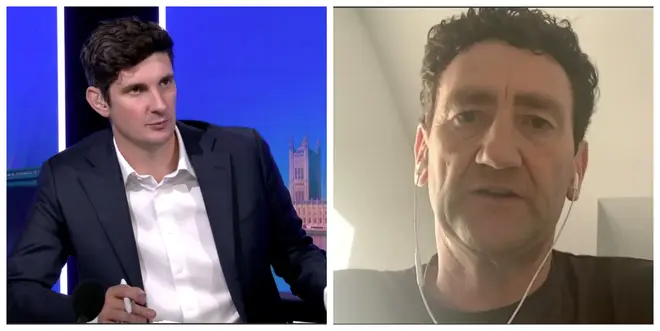
Paul Brand 10am - 12pm
25 October 2020, 13:39 | Updated: 25 October 2020, 13:46

The Welsh Lead at the Police Federation has told LBC's Swarbrick on Sunday he “couldn’t see a court deciding to prosecute” people over the ban on supermarket non-essentials, saying practical solutions are needed.
Mark Bleasdale told Tom it was “for shopkeepers to manage” the restrictions on the ban of non-essential items during Wales’ firebreak lockdown and that police officers will always use a “scaled approach”, with enforcement the last resort.
With videos circulating on social media of members of the public ripping plastic sheeting off items deemed non-essential in supermarkets, Mr Bleasdale said police are getting “caught in the middle of this”, with “feelings running high”.
“The longer this goes on there is going to be some - it has been quoted as ‘covid fatigue’,” he added.
“I think the difficulty is the message has still got to be very clear as to what people can and cannot do and why they are being asked to do it.
“That is maybe where this hasn’t been working, that the messaging isn’t clear from the government.”
Read more: 'Nanny state': Business leaders condemn non-essentials retail ban in Wales

Mark Bleasdale on Welsh restrictions
Earlier on Swarbrick on Sunday, the former secretary of state for Wales, Alun Cairns, described the non-essentials ban as “nonsensical” and a “dangerous precedent of socalism”.
Thanking Tom for “highlighting this issue”, the Conservative MP criticised the Welsh government's national lockdown and said it adds “insult to injury you are not even allowed to buy what they deem to be non-essential items”.
“It is the socialist structure, where one size fits all. They know better rather than following the science, which my constituents are calling for,” he continued.

Alun Cairns on Welsh Government's lockdown measures
Mr Cairns gave the example of a foster carer, who he said had emailed him after being unable to “source items quite late in the day for a child...because they were deemed non-essential”.
Challenged by Tom about what the police would do in this situation, Mr Bleasdale said: “If I was an operational police officer at the time and I was asked to do that, I would be contacting a local shop to see whether they would provide that for nothing. A practical solution.
“There will always be the narrow group of people in these circumstances that you and Mr Cairns have just mentioned, where I couldn’t see a court deciding to prosecute those people at the end of the day. So we would have to find some practical solution to it at the time.”
Handing out punishments was not the way police were enforcing the legislation he added: “I mean that isn’t the way that officers across Wales have been asked to interpret the law and put it into action.
“They will always use a scaled approach to any bits of the legislation. First of all explaining why it is in place and asking people to change their behaviour.
“Enforcement is always going to be a last option and that is a general policing principle.”

Shopper tears out barricades to children's clothing in Wales